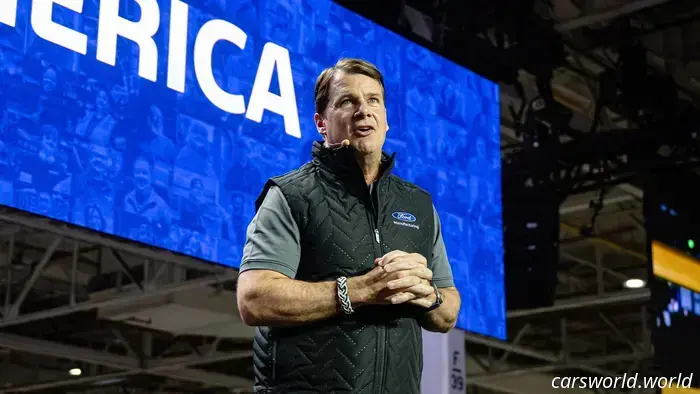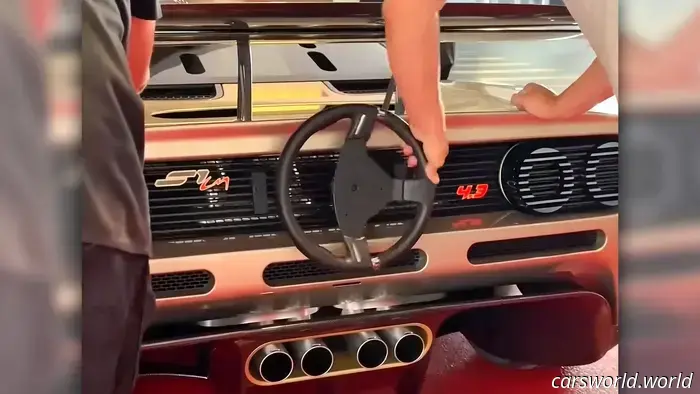
Ford's CEO Claims His Daughter's Boyfriend Damaged an F-150 with a Poor Tune.
Ford
The latest car news and reviews, straightforward and unfiltered.
Our complimentary daily newsletter delivers the most important stories directly to you every weekday.
Jim Farley serves as the CEO of Ford Motor Company and is also a father. These two roles intersect in unexpected ways, as he shared during this week’s episode of the Decoder podcast. When questioned about Ford's choice to restrict the Mustang’s ECU to prevent easy modifications by tuners, Farley recounted a humorous incident involving his daughter's boyfriend, a potentially modified F-150, and a discarded camshaft.
Although Farley emphasizes that Ford supports owners seeking enhanced performance from their vehicles, he suggested that automakers face challenges in accommodating shops that may lack the necessary tools for creating safe modifications.
“The aftermarket presents a real opportunity, but it poses a significant challenge for us as well because many individuals want to alter the software in the control module governing the powertrain for improved performance. However, they may not realize, and the end user might be unaware, of the reliability and quality problems that could arise, which can be quite costly,” Farley stated. “My daughter's boyfriend is one of those individuals. He purchased a brand-new F-150, equipped it with a supercharger, and recently encountered numerous error codes after he updated the ECU contrary to Ford’s guidelines, resulting in thousands of dollars in repairs due to damage to the camshaft. While he enjoyed the 650 horsepower from his EcoBoost F-150, he failed to consider the impact on the vehicle's reliability, which we must take into account at Ford.”
It’s fair to give Farley some leeway here; he likely misspoke regarding the boyfriend supercharging his twin-turbo V6 F-150. We all make mistakes, and Farley is knowledgeable about his products.
What’s crucial to note from this discussion is Ford's lack of interest in making exceptions for third-party modifications. Farley contends that shops often become overly ambitious when rewriting files that influence various aspects of a vehicle’s operation. Consequently, Ford faces the backlash, which explains the company's decision to secure the Mustang's ECU.
“All I can say is that it's a challenging matter to address,” Farley remarked. “We always strive to allow customers to tune their vehicles, but we also possess extensive knowledge about the vehicle's reliability. Will we, as a brand, risk diminishing our quality reputation to allow someone to modify their vehicle? That presents a difficult negotiation for us.”
Farley suggested that customers might modify their vehicles through Ford, essentially positioning the automaker as an aftermarket provider. In a sense, it already fulfills that role, given the extensive range of accessories and upgrades Ford currently offers. They even provide a factory tune for the Ranger Raptor and Bronco Raptor that boosts power by 50 horsepower and adds over 100 lb-ft of torque.
This indicates that Ford is unlikely to change its stance on third-party tuning. Whether viewed as image preservation or corporate greed, that's the reality. Don’t be surprised if other companies follow suit, as some already have.
Do you have a tip or question for the author? Reach out directly: [email protected]


Other articles
 The exterior steering wheel on this Gordon Murray concept car is brilliant.
Having two steering wheels is strangely appropriate for a supercar designed with three seats, such as Gordon Murray's S1 LM.
The exterior steering wheel on this Gordon Murray concept car is brilliant.
Having two steering wheels is strangely appropriate for a supercar designed with three seats, such as Gordon Murray's S1 LM.
 This 2,533 HP Xiaomi Ultra vs. Tesla Plaid drag race features an unexpected twist | Carscoops
In the latest head-to-head comparison from Carwow, China's Xiaomi SU7 Ultra competes against the Tesla Model S Plaid.
This 2,533 HP Xiaomi Ultra vs. Tesla Plaid drag race features an unexpected twist | Carscoops
In the latest head-to-head comparison from Carwow, China's Xiaomi SU7 Ultra competes against the Tesla Model S Plaid.
 Is Your BMW Set to Seem Outdated Instantly? Neue Klasse Facelifts Indicate Yes | Carscoops
A significant technological revolution is on the way for more than 40 vehicles by 2027, featuring enhanced infotainment systems, over-the-air updates, and substantial digital enhancements.
Is Your BMW Set to Seem Outdated Instantly? Neue Klasse Facelifts Indicate Yes | Carscoops
A significant technological revolution is on the way for more than 40 vehicles by 2027, featuring enhanced infotainment systems, over-the-air updates, and substantial digital enhancements.
 A GM Dealer Technician Purchased This Z06 Corvette Brand New but Seeks to Sell It After Only 2,400 Miles | Carscoops
A high-winding 2024 C8 is available for sale on Cars & Bids and has only driven 2,400 miles since it was new.
A GM Dealer Technician Purchased This Z06 Corvette Brand New but Seeks to Sell It After Only 2,400 Miles | Carscoops
A high-winding 2024 C8 is available for sale on Cars & Bids and has only driven 2,400 miles since it was new.
 The Subaru Legacy Is No More, But This Digital Concept Brings It Back to Life | Carscoops
This design reinvents the discontinued midsize sedan as an electric vehicle, revitalizing the traditional nameplate.
The Subaru Legacy Is No More, But This Digital Concept Brings It Back to Life | Carscoops
This design reinvents the discontinued midsize sedan as an electric vehicle, revitalizing the traditional nameplate.
 Toyota Is Ending Its Collaboration with Subaru for a New Sports Car in Favor of Mazda: Report
This speculated partnership might be beneficial for Toyota and Mazda, but what implications does it have for Subaru?
Toyota Is Ending Its Collaboration with Subaru for a New Sports Car in Favor of Mazda: Report
This speculated partnership might be beneficial for Toyota and Mazda, but what implications does it have for Subaru?
Ford's CEO Claims His Daughter's Boyfriend Damaged an F-150 with a Poor Tune.
When questioned about Ford's decision to secure the ECUs on its performance vehicles, Farley provided an apt illustration. Poor kid.
